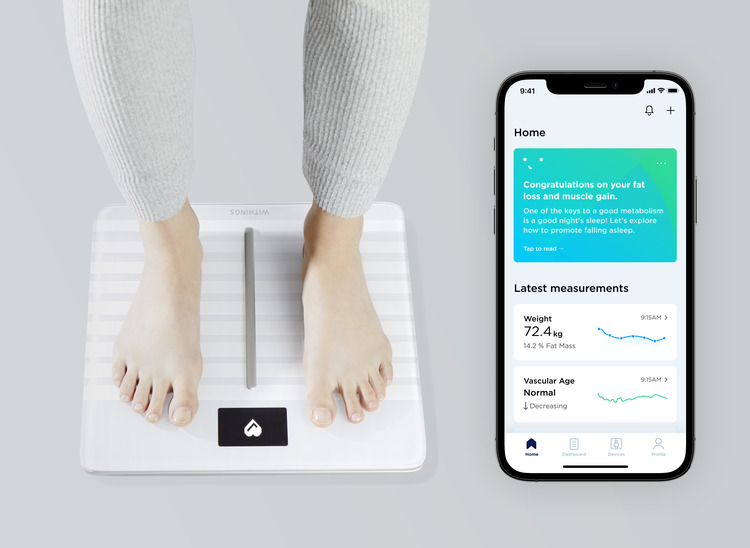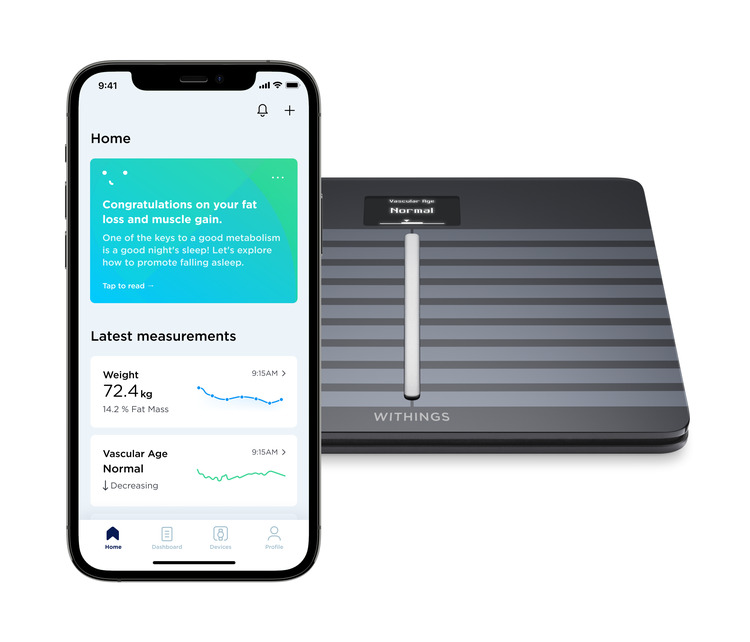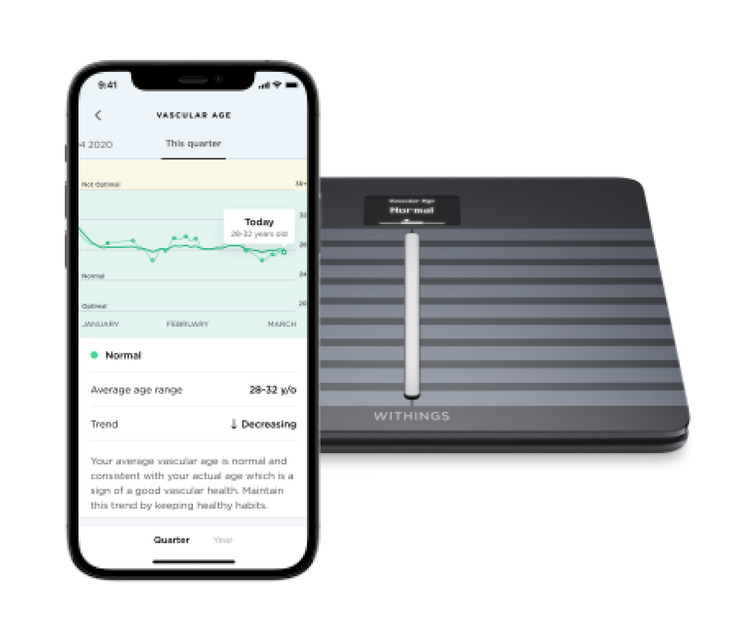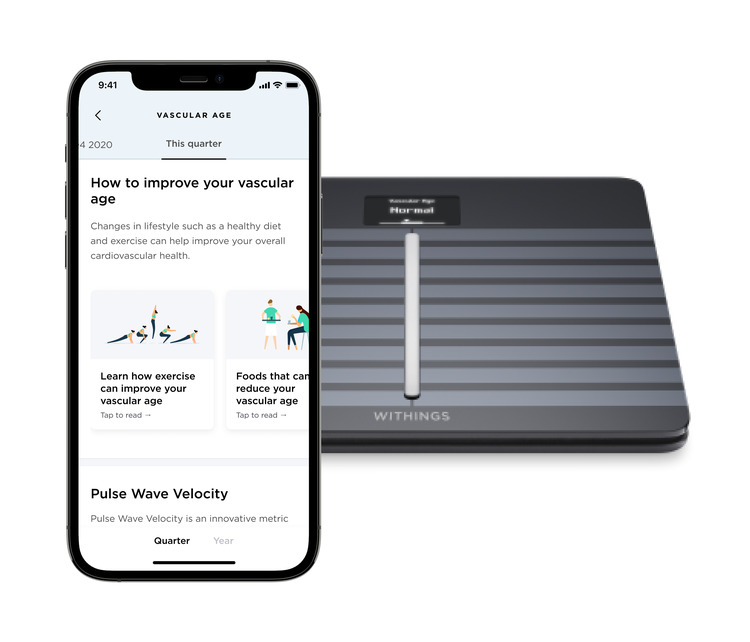Withings Body Cardio scales don’t just measure your weight. They also measure your heart health. In fact, that’s not all – they also give you a full body composition analysis. It’s akin to having your own personal health advisor!
Before we start, however, it’s time for a confession. I’ve not had scales in the house since I was a kid. I’m actually quite anti-scales. I only ever weigh myself when it’s required, usually at doctor’s appointments, although the more I think about this, the more this specific memory eludes me. Let’s just say that it’s a rare moment that I step onto scales. I’m just not bothered – I think there’s more to health than just weight.

I’ll put it out there right away – I’m already a fan of the Withings family. I wear their Steel HR Sport and use their Sleep Analyzer to help me keep an eye on my sleep (which is shameful – I need to improve this!) and my dad (who used to be a doctor) has the ScanWatch. So I know how good their products are.
Setting up the scales is quick, seamless and was so easy, that I can’t even remember doing it. It takes minutes, if that, before they’re ready to use.
Here’s what the Body Cardio measures:
Weight – as you’d expect, you can change this to kg or stones and also have several different profiles on there. If you’re like me, despite weighing myself at consistent times each day, your weight can fluctuate (between 67.5 and 62kg in one day!) it also shows you a weight trend, so you can see the bigger picture.
Heart Rate – yes, you heard right. It measures heart rate at every weigh in.
Body Fat % – this is measured using bio-impedance analysis. Which means that an electrical current (you can’t feel anything, don’t worry), is sent from your feet to the lower half of your body and back again. Because there’s a difference in resistance between body and lean tissue when the electric current is passed through the body, the Withings Body Cardio uses this to measure body fat %. Excess body fat, especially around the stomach are at greater risk of developing diseases such as diabetes, or being at higher risk of stroke.



Muscle Mass % – this is an indicator of the weight of your muscles. And the more muscle mass you have, the more your body may burn more calories at rest.
Bone Mass % – this is the weight of your bones. Especially as a female who’s approaching 40, I’m very conscious that my bones are getting thinner which can increase my likelihood of breaks and osteoporosis.
Water % – this measures the total fluid in your body, both in cells and tissues. Measuring water is a great indicator of health and being wellbeing and dehydration can lead to an inability to focus, sports performance and general wellbeing. For those who are sports-led, measuring your water % before and after training can be a good indicator of how much you need to hydrate.
BMI – BMI stands for Body Mass Index and Withings chooses to include this, even though many agree that it’s an outdated way to measure health.
Vascular Age – vascular age is a health metric which measures your arteries’ age. It uses pulse wave velocity to assess the stiffness in your arteries and it does this by measuring the time difference between the blood being pushed out your art and the arrival of the blood flow in your feet. It’s measured in comparison to other Withings Body Cardio users, and set against your chronological age, and has been developed with cardiology specialists.
And here’s my measurements
Overall, things are mostly fine, although it’s definitely a wake-up call for areas which would be beneficial to improve.
- My Vascular age sits right in the middle of normal, so while I shouldn’t worry too much, there’s definitely room for improvement.
- I’m on the high end of fat mass (my last measurement was 31% and between 14% and 30% if considered healthy. This is something which I’m concerned about as I tend to put weight around my belly and high waisted leggings hides this well. Plus, I’m a Labrador – I can eat for England, and eat when I get bored, or when I’m putting off work!
- My muscle mass is just over 66 and a healthy range is considered between 66 – 78%, so I would like to improve this. I’ve barely prioritised time for my own fitness so this is a good nudge that I need.
- Healthy bone mass percentage is between 2.5 and 4% for women, and I sit at 3.5% so I’m happy with this.
- Body water percent is considered normal around 50%. Mine always sits just under, fluctuating between 48 – 49% and I’m making a conscious effort to keep hydrated, as I know this is something I forget.
- PWV, or pulse wave velocity, is comfortably within normal.
Favourite features
Can I say all of them?! It’s hard to pick one specific feature, as you’ve got to look at all the figures together to get a fuller picture of health. I like that there’s tips for improving your scores – there’s nothing worse than getting a health score and then not having any practical advice to go with it.
If there’s one thing I love, it’s the pregnancy tracker. Not only does it adjust its advice to your pregnancy, but once you’ve had your baby, you can also use your scales to measure their weight. Genius!
Final thoughts
So it turns out, I’m anti-the-old-kind-of-scales. The one-trick pony scales – the ones which just measure weight. Because weight, on it’s own, is just a number. But put it into context and it can tell you a lot.
The Withings Body Cardio scales has helped give me direction in where and how I can improve my health for the best results. I’m keen to build more muscle and decrease fat % and my action plan is to schedule in 3 twenty minute weights workouts in a week, plus, be more mindful about what I eat. I have a tendency to overeat and snack, so ensuring I eat meals which are filling and having healthy snacks around is going to help. I shall keep you updated!
Find out more about the Withings Body Cardio scales at withings.com
Withings Body Cardio Scales cost £108.29 from the Withings website and can also be purchased from Amazon (prices may vary) and other stores.

Leave a Reply